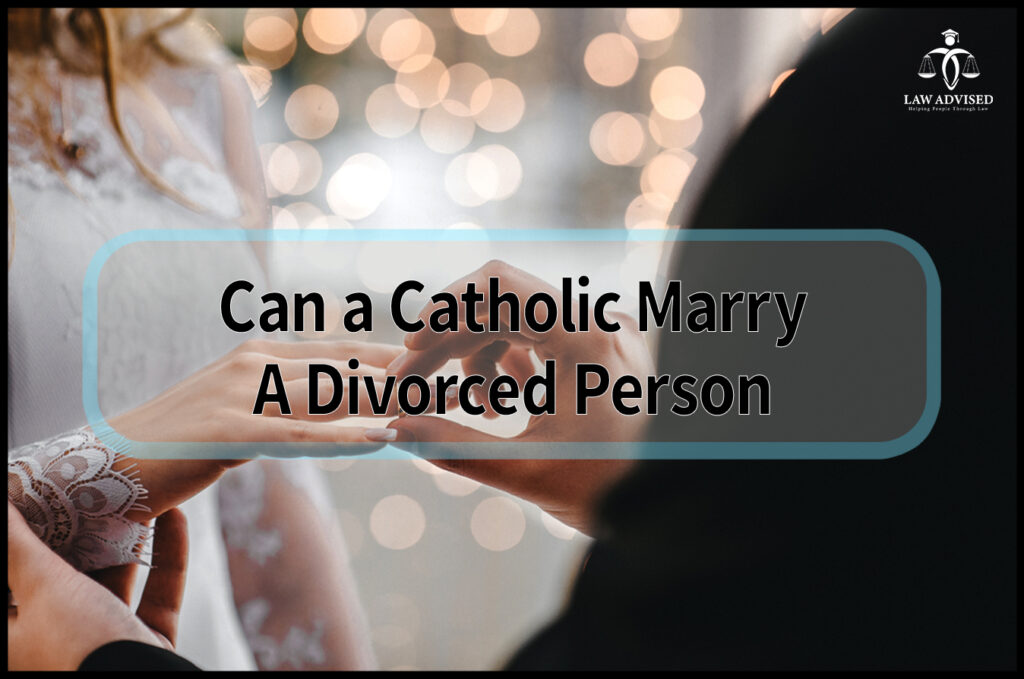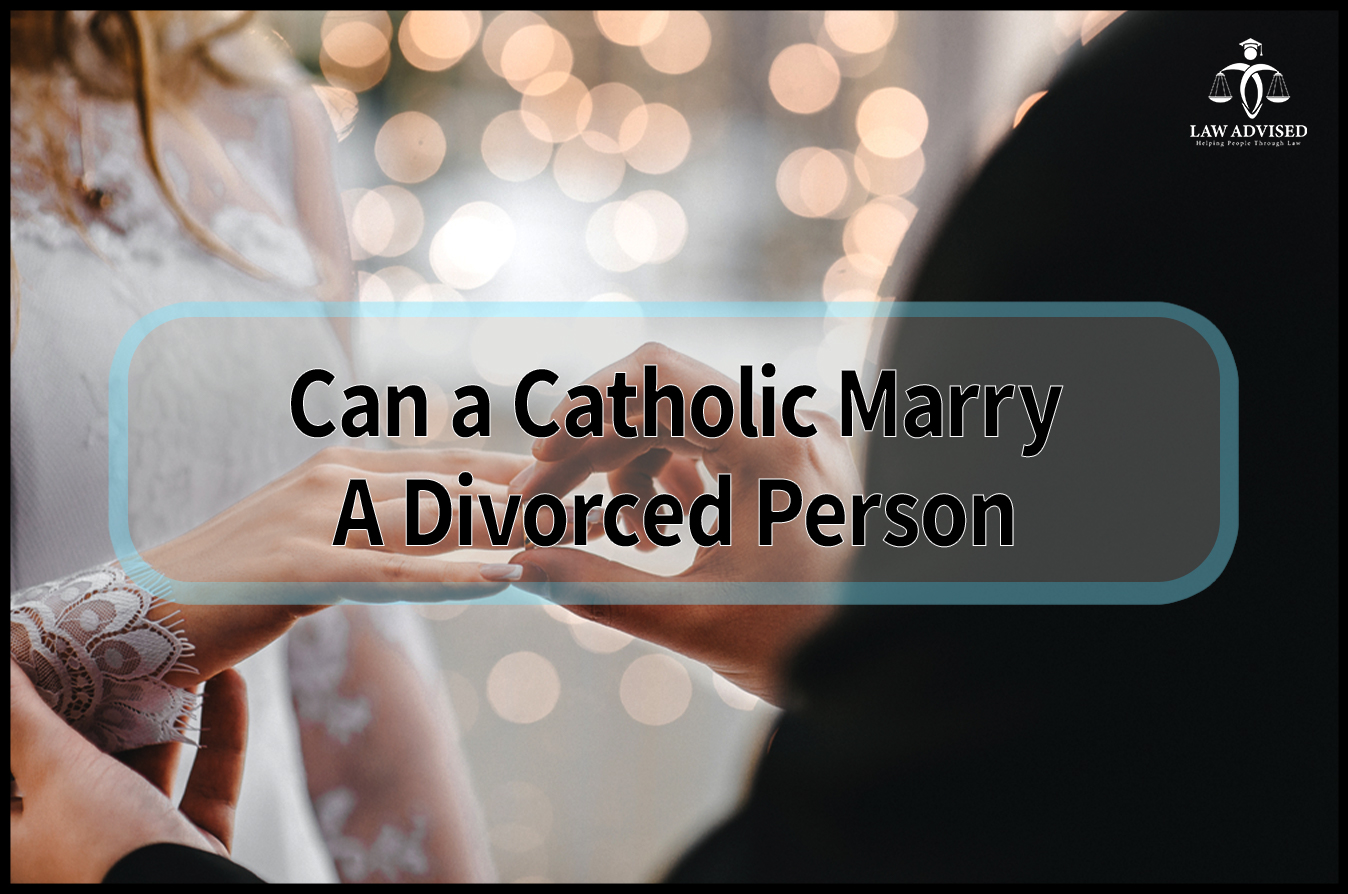Yes, a Catholic can marry a divorced person, but it requires authorization from the Catholic Church.
The Catholic Church’s Stance On Marriage And Divorce
In Catholicism, the sanctity of marriage is highly regarded, emphasizing its indissolubility. According to the Church’s teachings, marriage is a sacrament that unites two individuals, reflecting the bond between Christ and His Church. Understanding the concept of indissolubility is crucial in comprehending why the Catholic Church has traditionally viewed divorce as unacceptable.
Marriage, in Catholic theology, is seen as a lifelong commitment between two individuals who have freely chosen one another. This view is rooted in biblical teachings, such as the words of Jesus, who stated, “What therefore God has joined together, let no man separate” (Matthew 19:6). The Church believes that once a valid marriage has been contracted, it cannot be dissolved, even if civil divorce is obtained. The Church does not recognize divorce and considers the couple to still be married in the eyes of God.
Despite the indissolubility of marriage, the Catholic Church acknowledges that some marriages may be invalid from the beginning. Annulment, a declaration by the Church that a marriage was not sacramentally valid, provides a way for those in such circumstances to seek resolution. However, it is essential to distinguish between an annulment and a divorce, as an annulment declares the marriage was never valid, rather than dissolving an existing marriage.
The Church’s Teachings On Divorce And Remarriage
The Catholic Church has firm teachings on divorce and remarriage. These teachings have evolved and developed over time. Throughout history, the Church has released papal encyclicals and official documents that address the subject of marriage and divorce. These documents provide guidance and clarification on the Church’s stance.
They emphasize the indissolubility of marriage and the importance of commitment and fidelity. In addition to divorce, Catholicism recognizes the concept of annulment. An annulment is a declaration by the Church that a marriage was invalid from the beginning. It states that the sacrament of marriage did not occur due to certain conditions not being met. This allows Catholics who obtain an annulment to remarry within the Church. The Church views annulment as a way to protect the sanctity and significance of the sacrament of marriage.
The Role Of Personal Conscience And Pastoral Accompaniment
The Catholic Church recognizes the complexity of marital situations involving divorce and remarriage and acknowledges the importance of individual discernment in such cases. Rather than making blanket rules, the Church emphasizes the role of personal conscience and pastoral accompaniment in guiding Catholics facing these challenges.
Pastoral guidance in the context of divorce and remarriage involves a compassionate understanding of the unique circumstances of each individual. This understanding is rooted in the Church’s emphasis on mercy and reconciliation, recognizing that every situation is different and requires individual discernment. The Church encourages Catholics facing divorce and remarriage to seek spiritual guidance and support from their pastors and other pastoral resources.
Through this approach, the Church aims to provide pastoral care that respects the dignity and complexity of human relationships while upholding its teachings on the sacrament of marriage. Ultimately, the Church seeks to guide individuals toward spiritual growth, healing, and reconciliation, taking into account the individual circumstances of each person.
Legal And Canonical Aspects Of Marriage And Divorce In The Catholic Church
The Catholic Church has a firm stance on divorce and remarriage, guided by its Canon Law. According to Canon Law, divorce is not recognized by the Church, as marriage is considered a sacred bond that cannot be broken. However, the Church does recognize the possibility of annulment, which declares a marriage to be null and void from the beginning. This means that in the eyes of the Church, marriage never existed.
For an annulment to be granted, certain conditions must be met, and a thorough investigation is conducted by the Church’s tribunals. The process involves gathering evidence, testimonies, and various forms of documentation. The decision lies ultimately with the tribunal, which consists of experts in Canon Law.
Priests play a significant role in guiding individuals through the process of annulment and declaration of nullity. They provide pastoral care and support, educating the faithful about the Church’s teachings on marriage. Priests also act as intermediaries between individuals seeking an annulment and the tribunal.
Pastoral Responses In Favor Of Greater Flexibility
Many discussions have arisen within the Catholic Church regarding the issue of whether a Catholic can marry a divorced person. The synodal process has sparked calls for greater flexibility in the Church’s approach to this matter. These discussions have gained traction as many individuals and communities advocate for a reconsideration of the Church’s stance towards divorced and remarried Catholics.
One particular document, Amoris Laetitia, has been at the center of controversies and various interpretations. The controversies surrounding this document reflect the ongoing dialogue within the Church on how to best address the pastoral needs of divorced individuals. This ongoing dialogue is driven by a desire to find a compassionate and inclusive response, while still remaining rooted in the teachings and principles of the Catholic faith.
Ecumenical Perspectives On Divorce And Remarriage
When discussing the topic of divorce and remarriage within the context of Catholicism and other Christian denominations, it is important to consider the various ecumenical perspectives and ongoing dialogue surrounding this issue.
The Catholic Church holds a firm stance on the indissolubility of marriage, emphasizing the sacramental nature of the union. Divorce is generally not recognized, and remarriage after divorce is considered adultery unless the previous marriage is declared null. This position differs from other Christian denominations, such as Anglicanism, which allows for divorce and remarriage under certain circumstances.
Ecumenical dialogue has been instrumental in facilitating a deeper understanding and appreciation of diverse viewpoints on divorce and remarriage. Efforts towards greater unity and inclusivity in Christian communities are ongoing, with discussions focused on finding common ground while respecting the theological differences that exist.
| Catholic Church | Other Christian Denominations |
|---|---|
| Emphasizes indissolubility of marriage | Allows for divorce and remarriage under certain circumstances |
| Considers remarriage after divorce as adultery | Recognizes divorce and remarriage |
The ecumenical dialogue on marriage and the possibility of intercommunion is essential for fostering mutual understanding and collaboration among Christians. It provides a platform for respectful exchanges that contribute to progress in resolving differences and promoting unity in the body of Christ.
Challenging The Church’s Teachings: Modern Perspectives And Critiques
Challenging the Church’s Teachings: Modern Perspectives and Critiques
Divorce and remarriage have long been contentious issues within the Catholic Church. However, in contemporary society, there are increasingly critical perspectives on the church’s stance in this regard. Critics argue that the church’s teachings on divorce and remarriage fail to account for the impact of cultural and societal changes on the understanding of marriage.
One key argument put forth is the need for a more compassionate and inclusive approach. As societies evolve, so too do our perspectives on what constitutes a healthy and fulfilling marriage. Many people argue that the church should take into consideration the personal growth and happiness of individuals involved, rather than adhering strictly to outdated dogma.
This shift towards a more inclusive approach poses a challenge to the traditional teachings of the Catholic Church. As individuals continue to question and critique these teachings, the church will need to engage in dialogue to address the evolving needs and perspectives of its members.
Navigating The Complexities: Practical Advice For Individuals
Seeking guidance from priests, spiritual directors, and support networks Finding spiritual healing and personal growth amidst divorce and remarriage Embracing the teachings of the Church while living in complex marital situations.
Marriage is a sacred institution in the Catholic faith, and many individuals facing the prospect of marrying a divorced person can feel unsure about the Church’s position. Seeking guidance from priests, spiritual directors, and support networks can provide valuable insight and support in navigating this complex issue. It is important to remember that everyone’s situation is unique, and finding spiritual healing and personal growth should be at the forefront of one’s journey.
Embracing the teachings of the Church while living in complex marital situations involves a combination of prayer, discernment, and understanding the sacramental nature of marriage. By remaining open to God’s grace and staying connected to the community, individuals can find solace and guidance in their pursuit of a Christ-centered marriage.
Frequently Asked Questions For Can A Catholic Marry A Divorced Person

Can A Catholic Marry A Divorced Person?
Yes, a Catholic can marry a divorced person through an annulment or declaration of nullity process.
What Is The Catholic Church’s Stance On Divorce?
The Catholic Church does not allow divorce but recognizes annulments as a declaration that a marriage was never valid.
How Long Does The Annulment Process Take?
The annulment process can vary in length, usually taking around 12 to 18 months to complete.
What Are The Grounds For Annulment In The Catholic Church?
The grounds for annulment in the Catholic Church include lack of consent, psychological incapacity, and impotence among others.
Can A Divorced Catholic Receive Communion?
A divorced Catholic can receive communion if they have obtained an annulment or are living a chaste life.
Is Marrying A Divorced Person Considered A Sin In Catholicism?
Marrying a divorced person is not considered a sin as long as the proper procedures, like annulment, have been followed.
Can A Catholic Wedding Take Place In A Non-catholic Church?
A Catholic wedding can take place in a non-Catholic church with special permission from the local bishop.
Can A Divorced Non-catholic Marry A Catholic In The Catholic Church?
Yes, a divorced non-Catholic can marry a Catholic in the Catholic Church, but the non-Catholic’s previous marriage needs to be examined for validity.
Conclusion
To summarize, while the Catholic Church acknowledges the sanctity of marriage, it also recognizes the complexity surrounding divorce. Through its annulment process, the Church provides opportunities for divorced individuals to potentially marry within the faith. However, it is essential for individuals to consult with their local diocese and seek guidance from a priest to ensure compliance with the Church’s teachings.
Ultimately, the decision lies with the Church, and couples must navigate this sensitive issue with understanding, faith, and love.
Ismail Hossain is the founder of Law Advised. He is an Divorce, Separation, marriage lawyer. Follow him.





Leave a Reply